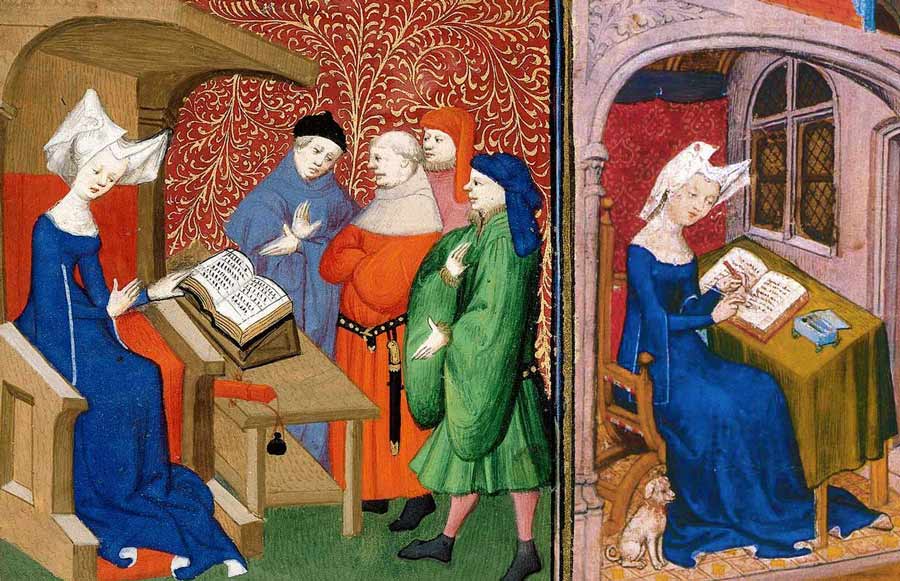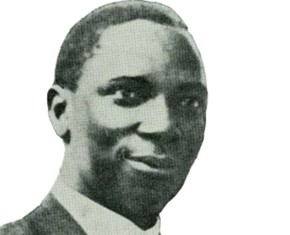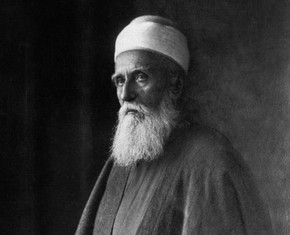The views expressed in our content reflect individual perspectives and do not represent the authoritative views of the Baha'i Faith.
When people say “feminist movement” it brings to mind the 1960s and 70s—but the Baha’i teachings advocated women’s rights a hundred years earlier.
Of course, the fight for women’s suffrage spanned the 1840s to the 1920s for Americans—and lasted even longer for many other countries. But women have asked for equal rights for hundreds if not thousands of years. One such early “feminist” was Christine de Pisan.
The French poet Christine de Pisan (1365-1430) was arguably the first female author in Europe to make her living as a writer. Many historians view de Pisan as one of the originators of the feminist movement, “since she espoused female achievements and was the spokesperson for the rights of women in her time.” – www.MiddleAges.net
She had some advantages: first, a father who ensured she got an excellent education and who gave her free rein in his extensive literary collection, and then a husband who encouraged her intellectual pursuits and her gift for writing. She was able, therefore, when widowed in her early twenties, to use her skills to support herself and her three children.
de Pisan exemplifies why women, as the Baha’i teachings insist, must be educated:
Now in the two lower kingdoms of nature we have seen that there is no question of the superiority of one sex over the other. In the world of humanity we find a great difference; the female sex is treated as though inferior, and is not allowed equal rights and privileges. This condition is due not to nature, but to education. In the Divine Creation there is no such distinction. Neither sex is superior to the other in the sight of God. Why then should one sex assert the inferiority of the other, withholding just rights and privileges as though God had given His authority for such a course of action? If women received the same educational advantages as those of men, the result would demonstrate the equality of capacity of both for scholarship. – Abdu’l-Baha, Paris Talks, p. 161.
Famous for her poetry and love ballads, de Pisan also wrote prose and political treatises. With the encouragement and aid of royals de Pisan completed a biography of France’s King Charles V. Her final work was a poetic eulogy dedicated to Joan of Arc. But the literature for which de Pisan is most celebrated today are her writings that pressed for women’s rights.

Christine de Pisan
Her 1399 Epistle to the God of Love decries the demeaning manner in which misogynist male authors portrayed women in the literature of the time. Her work instituted fierce literary debates between her and some of these male writers. The year 1405 saw the publication of two of her pieces in this genre, which are considered her most successful out of her prolific work.
The Book of the City of Ladies uses three allegorical figures, Reason, Justice, and Rectitude, to illustrate and appreciate the contributions of women to society. She tears away at negative stereotypes and posits that they can be eradicated if women break down the male-dominated conversations in which their participation is discouraged.
In The Treasure of the City of Ladies, also known as The Book of the Three Virtues, de Pisan outlines how women should conduct themselves in order to be successful in their pursuit of equality and respect. She wrote that “skill in discourse should be a part of every woman’s moral repertoire.” She herself was a master of, and an example of, the persuasive power of rhetoric.
Christine de Pisan demonstrated through her writings what Baha’u’llah wrote about the power of speech and the written word:
Human utterance is an essence which aspireth to exert its influence and needeth moderation. As to its influence, this is conditional upon refinement, which in turn is dependent upon hearts which are detached and pure. As to its moderation, this hath to be combined with tact and wisdom … – Tablets of Baha’u’llah, p. 143.
Abdu’l-Baha said that women like Christine de Pisan—fighters for the rights of the female half of humankind—should “shine like a lamp” and strive to “be even superior to the men” in their pursuit of excellence:
I hope for a like degree of progress among the women of Europe—that each may shine like unto a lamp; that they may cry out the proclamation of the kingdom; that they may truly assist the men; nay, that they may be even superior to the men, versed in sciences and yet detached, so that the whole world may bear witness to the fact that men and women have absolutely the same rights. – Abdu’l-Baha, Divine Philosophy, p. 88.
















Comments
Sign in or create an account
Continue with Googleor